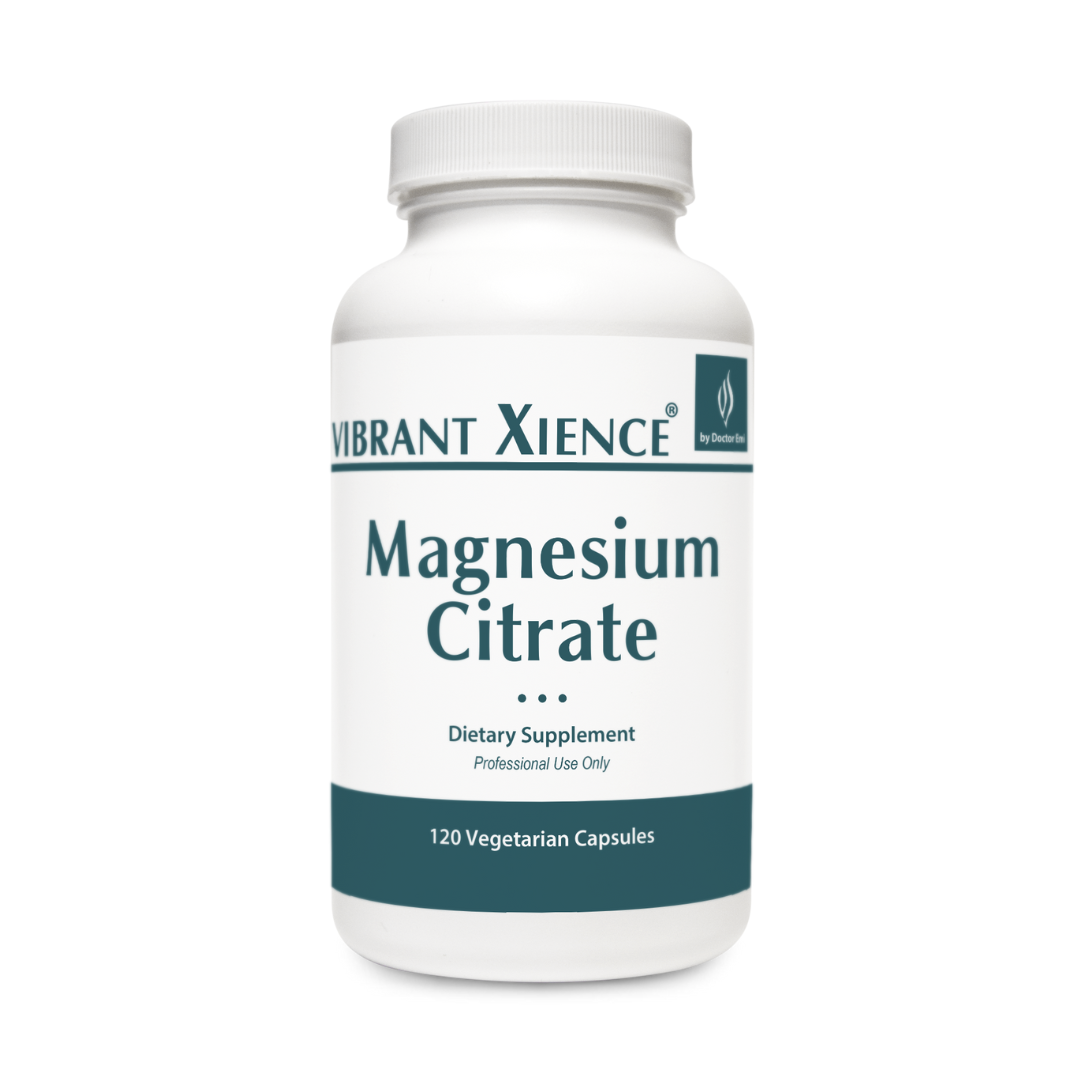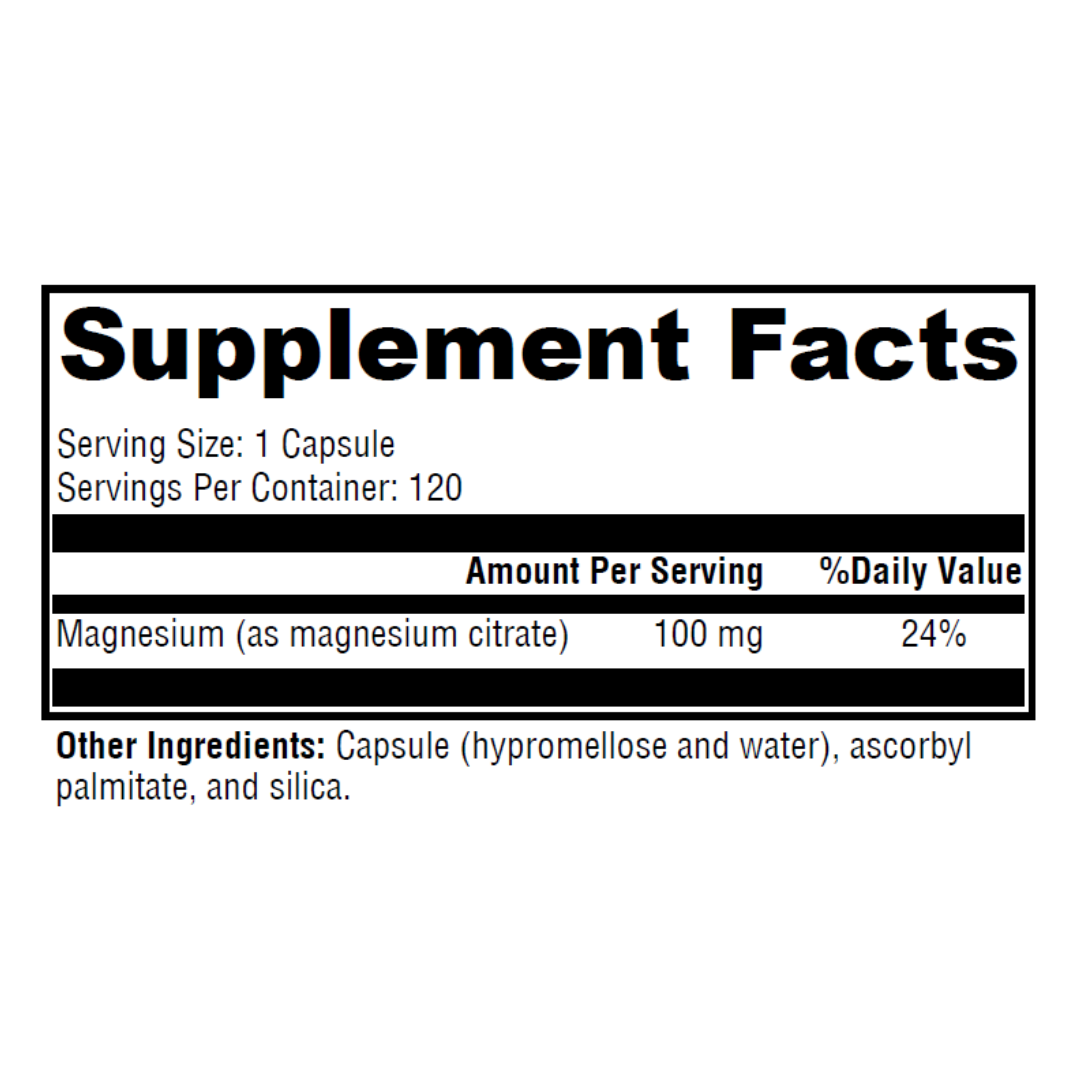Vibrant Xience X
Magnesium Citrate
Magnesium Citrate
Couldn't load pickup availability
120 Capsules (120-day supply)
- Supports Magnesium Nutritional Adequacy*
- Supports the Numerous Metabolic Activities of Magnesium in the Body*
- Facilitates Bowel Movement*
- Helps Prevent Calcium Crystallization in the Kidneys*
*These statements have not been evaluated by the Food and Drug Administration. This product is not intended to diagnose, treat, cure or prevent any disease.
Magnesium Citrate: Overview
Magnesium plays a vital role in hundreds of metabolic activities. The mineral particularly supports muscle and nervous system function. Magnesium Citrate supports healthy bowel movement by attracting water when it is in the intestine.*
Learn more: Confused About Magnesium Compounds?
- Non-GMO
- Soy-Free
- Gluten-Free
- Made in the USA
- Manufactured in a GMP Compliant Facility
DOES NOT CONTAIN: wheat, gluten, corn, yeast, soy, animal or dairy products, fish, shellfish, peanuts, tree nuts, egg, ingredients derived from genetically modified organisms (GMOs), artificial colors, artificial sweeteners, or artificial preservatives.
Magnesium Citrate: Directions
Take one capsule daily, or as directed by your healthcare practitioner.
Consult your healthcare practitioner prior to use. Individuals taking medication should discuss potential interactions with their healthcare practitioner. Do not use if tamper seal is damaged.
Magnesium Citrate: Other Ingredients
HPMC (capsule), stearic acid, medium-chain trigylceride oil, magnesium stearate, and silica.
Magnesium Citrate: Storage
Keep closed in a cool, dry place out of reach of children.
Magnesium Citrate: In-Depth Information
Magnesium—the fourth most abundant mineral in the body—participates in over 300 enzymatic reactions in nearly all tissues. Deficiency is common. The average American diet is thought to provide about 40% of the daily magnesium need, and reports from the World Health Organization have suggested that three quarters of Americans fall short of the daily requirement.[1] Furthermore, because magnesium is predominantly an intracellular cation, serum magnesium remains a poor predictor of tissue magnesium content and availability; therefore, deficiency can sometimes go undetected.[1] Magnesium deficiency can result from poor dietary intake, poor absorption, and excessive losses through urine, stool, perspiration, or lactation. Certain drugs, certain herbs, poor kidney function, excessive alcohol intake, and drinking mostly “soft” water can contribute to magnesium depletion.[1,2] It is also important to note that physical and emotional stresses increase the need for magnesium and that hypomagnesemia and stress potentiate each other’s negative effects.[3,4] Moreover, the adrenergic effects of psychological stress cause movement of magnesium from intracellular to extracellular space, which increases urinary excretion and depletion of body stores.*[4,5]
Magnesium participates in the development and maintenance of bones and teeth; the metabolism of carbohydrates, proteins, and fats; the formation of cells and tissues; the modulation of cytokines; and the maintenance of muscle function, including the heart.[1,6,7] Magnesium, in the form of magnesium citrate, is often used in the short term for bowel movement support, and some individuals find it useful for preventing calcium crystallization in the kidneys.*
Bioavailability
In vitro and in vivo research has demonstrated superior solubility and bioavailability of magnesium citrate compared to magnesium oxide.[8] A 60-day randomized, double-blind, placebo-controlled, parallel intervention study compared a daily dose of 300 mg of elemental magnesium as magnesium citrate to the oxide and chelate forms. In this study (n=46), magnesium citrate showed the greatest increase in magnesium concentration in the 24-hour and 60-day post-supplementation serum and saliva specimens.*[9]
Bowel Movement Support
Magnesium citrate is a magnesium salt with citric acid in a 1:1 ratio. The bioavailability and pharmacokinetics of various magnesium salts correlate with their structure/activity relationship. Magnesium citrate is considered to be a purgative because it relaxes the bowel and pulls water into the intestine. This, in turn, softens the stool and stimulates movement of the muscles in the colon, leading to a bowel movement.*
Kidney Support
According to studies on magnesium and citrate, increased water intake and supplementation with magnesium or citrate help bind calcium and prevent its crystallization and aggregation—actions that support kidney health.[10,11] In one study, magnesium citrate was found to inhibit the growth of stone fragments after extracorporeal shock wave lithotripsy.[12] In other research, calcium phosphate and calcium oxalate deposits were higher in individuals with low urinary citrate levels.*[13]
Other Research
A sampling of studies on PubMed indicates that at doses of 300-500 mg/d, magnesium citrate also has roles in supporting sleep quality,[14] improving metabolic markers (e.g., fasting insulin and C-peptide) in overweight individuals,[15] maintaining healthy blood pressure already within the normal range,[16] and reducing nighttime leg cramps.[17] These varied effects illustrate the many metabolic and physiological roles of magnesium and the usefulness of magnesium in citrate form.*
NOTICE: Check with your personal physician before starting this or any other supplements.
*These statements have not been evaluated by the Food and Drug Administration. This product is not intended to diagnose, treat, cure or prevent any disease.
Share




